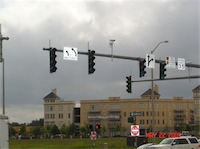Is this surveillance overkill?
A few weeks ago I noticed a few utility trucks working at an intersection I drive through quite often. I thought maybe it was related to the fiber optic push the city is making (way cool, super high speed acces, more info at LUSFiber.org), or perhaps red light cameras...
As time went on though, and work continued, I realized it was definitely red light camera related. What surprised me, and soon shocked me, was how intensive the camera setup became. It got to a point where I couldn't count the total number of cameras at this one intersection.
Now, let me be clear on something. I'm pro-red light cameras. I'm pro-speed vans. Frankly the argument that they invade your privacy is bunk. Outside, on a public road, in a multi-ton car? No, that's not private. I do know there are concerns that private companies are running them, but in my mind, if it lets the cops focus more on violent criminals, and slows people down, I'm all for it.
But I have to say - when I drive through this intersection now I feel like I'm in a prison, or in the middle of 1984. It's just... awe-inspiring the amount of camera "stalks" that are now set up. Check it out (and click to enlarge):
The street in question does suffer from speeder, but more so about 2 blocks down. This area is relatively stable as far as I know. In all my time on the road I've yet to see one accident. So what do folks think? Have you ever seen an intersection like this in your town? Is it overkill?








